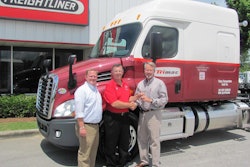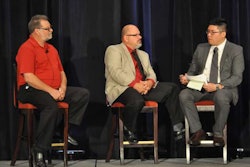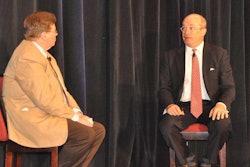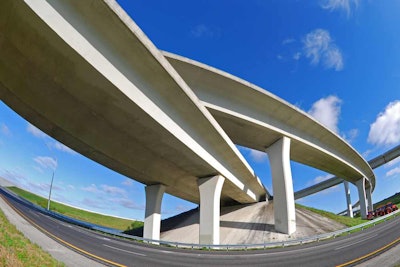
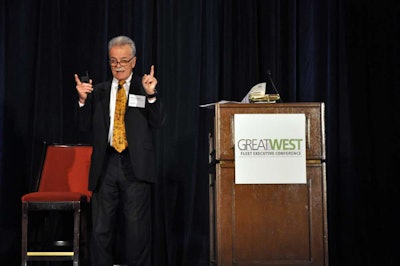 Will Kempton, executive director of Transportation California, speaks during a panel on infrastructure funding.
Will Kempton, executive director of Transportation California, speaks during a panel on infrastructure funding.The nation’s infrastructure is deteriorating faster than maintenance is being funded and highway expansion is not keeping up with traffic increases, panelists said Thursday at the Great West Fleet Executive Conference in Las Vegas.
Many revenue options, based on fuel taxes and other sources, are being considered to solve the problem, but there is no consensus on a solution, the panelists said. Their session concluded the conference Thursday as the Great West Truck Show opened.
Vehicle miles traveled are growing 10 times faster than lane miles, said Will Kempton, executive director of Transportation California, a coalition that works to boost transportation funding. Consequently congestion problems are increasing along with maintenance problems.
Because federal funding has been falling behind, many cities and states are taking more responsibility for their own transportation funding, said panel moderator Larry Ehl, publisher of Transportation Issues Daily.
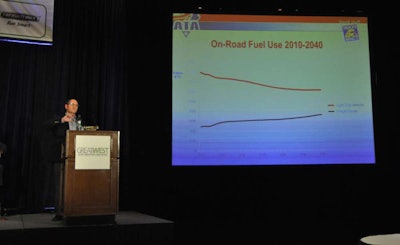 Darrin Roth, director of highway operations for the American Trucking Associations, gives a presentation during a panel on infrastructure funding.
Darrin Roth, director of highway operations for the American Trucking Associations, gives a presentation during a panel on infrastructure funding.He listed about 10 states that hadn’t raise fuel taxes in a decade or more — until last year, when they took action. Many local or state transportation projects now are being funded by new gas taxes, bonds, sales tax on gas, vehicle license fees, or other sources.
Conservative think tanks back the idea of the federal government getting partially or totally out of taxing fuel, Ehl said. The revenues would be returned to the states to spend on transportation without federal limitations on how to spend the funds.
The current highway spending of $70 billion from all sources needs to be almost doubled to prevent highway problems from getting worse, said Darrin Roth, director of highway operations for the American Trucking Associations.
One reason for the transportation funding crisis is that the federal Highway Trust Fund is dwindling. By 2023, the fund’s shortfall is expected to be $120 billion, he said.
Congress has been transferring money from the general fund to subsidize the trust fund. It accounts for a quarter of total highway spending, but 73 percent of interstate highway funding, Roth said, so its neglect has a major impact on trucking.
Gas taxes have accounted for a much smaller share of gas prices in recent years, Roth said. Just to account for revenues lost to inflation, the gas tax would need to increase from 18.3 cents to 29 cents a gallon.
There are also non-fuel sources of revenue proposed to help the Highway Trust Fund, such as freight fees, bonds, tolls and royalties on revenue from new drilling sources.
Others have proposed a vehicle miles traveled tax. There have been VMT pilot programs, all of which have “claimed some measure of success.” Some other countries have successfully used a VMT tax, Roth said. However, it is very expensive — 25 percent to 50 percent of revenue — to collect.
California has its own major transportation funding emergency, said Will Kempton, executive director of Transportation California, a coalition that works to boost transportation funding:
*Of the nation’s 20 most congested corridors, 14 are in California.
*Of the nation’s 10 worst cities based on urban pavement conditions, six are in California; 87 percent of California counties have a pavement condition risk of “poor” or “at risk.”
*55 percent of locally owned bridges need to be replaced or rehabilitated within 10 years.
This year is critical for California because certain revenue factors are producing a “cliff” situation that threatens to make a bad situation far worse, he said. These include decline in gas tax revenue, a diversion of transportation tax revenue and the end of revenue from a major bond issue.
A recent poll indicates Americans are aware of the transportation funding crisis, but of all the many proposed solutions, there is no one that voters — many of them jaded because of prior diversions of tax revenues from intended uses — would welcome.
“They hate the gas tax,” Kempton said. “They hate taxes in general.”




